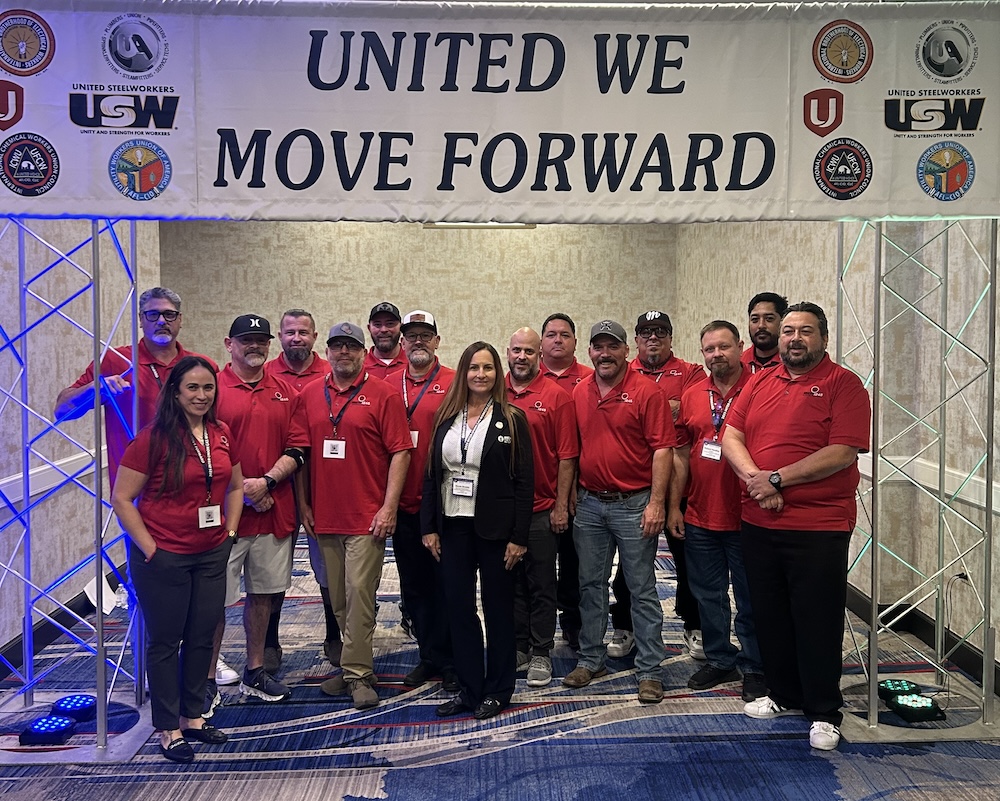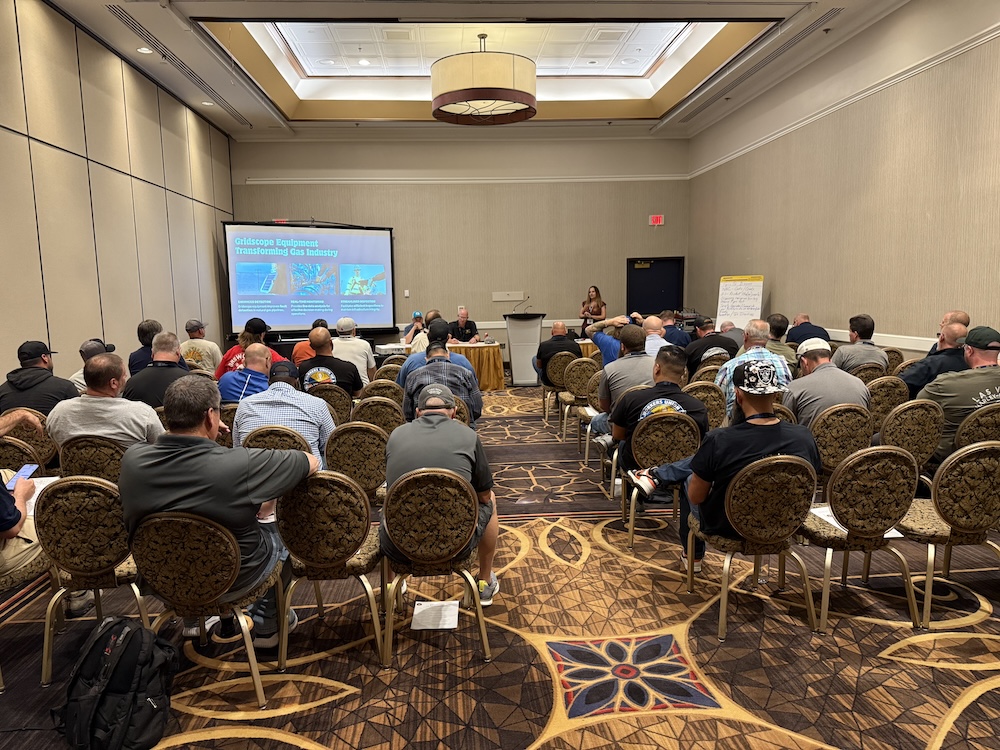Earlier this month, I had the opportunity to help facilitate the Gas Transmission, Storage, and Field Operations Workshop, alongside Ben Morgan of USW Local 348 and Josh Cleveland of the UA at the Inter-Union Gas Conference, where gas locals from across the U.S. and Canada came together to share insights on drones, robotics, hydrogen research, worker protections, and the future of our trade.
Over two days, more than 100 participants from utilities and trade unions across the country came together to talk about emerging technologies, shifting industry practices, and how unions can protect, strengthen, and expand our work.
Drones, Robotics, and the Importance of Skilled Union Labor
 We started with a discussion on the growing use of drones in the natural gas industry. We are seeing increased drone deployment in Liquefied Natural Gas (LNG) and Compressed Natural Gas (CNG) facilities for heat-breakthrough detection, bridge and dam leak surveying, thermal imaging, corrosion inspection, and monitoring easement encroachments.
We started with a discussion on the growing use of drones in the natural gas industry. We are seeing increased drone deployment in Liquefied Natural Gas (LNG) and Compressed Natural Gas (CNG) facilities for heat-breakthrough detection, bridge and dam leak surveying, thermal imaging, corrosion inspection, and monitoring easement encroachments.
While limitations remain — weather, distance, battery life — drones are advancing fast. And as these tools evolve, it becomes even more important that highly skilled union members remain leading this work. Their field experience helps prevent safety risks, ensures accuracy, and keeps utilities accountable as they adopt new technologies.
To make that happen, we need strong Letters of Agreement that define job scope, equipment classifications, and training requirements. Our members should be working alongside drone inspectors and operators, supported with qualification pathways and incentives, including aviation licensing. Technology may change the tools, but the inspection is still the work, and that work belongs to trained, qualified union professionals. We must stay unified in our fight to ensure that expertise continues to guide and define this critical work.
 We then moved to robotic inspection dogs and AI-driven pipeline welding. These technologies are being tested to perform leak detection, corrosion assessment, and welding in controlled environments. These technologies pose real jurisdictional challenges, and staying proactive is essential to protecting both safety and jobs.
We then moved to robotic inspection dogs and AI-driven pipeline welding. These technologies are being tested to perform leak detection, corrosion assessment, and welding in controlled environments. These technologies pose real jurisdictional challenges, and staying proactive is essential to protecting both safety and jobs.
Defending Worker Rights as Technology Expands: In-Cab Cameras
Another major topic was the installation of in-cab vehicle cameras in utility fleets. We emphasized the need for unions to secure protective language early — through negotiations, pilot agreements, and information-gathering.
Local 77 Assistant Business Manager Mike Brown shared a significant Administrative Law Judge decision affirming the union’s legal right to bargain over decisions and impacts related to vehicle camera installation in Region 19 (Washington and Oregon). This is a powerful example of how information sharing and coordinated advocacy across locals makes all of us stronger.
Hydrogen Research and the Questions We Must Keep Asking
We also talked about the NCPA Hydrogen Plant in Lodi, a partnership between IBEW 1245 and PG&E. The facility will study hydrogen interactions with different pipeline materials and explore the feasibility of producing up to 24 tons of hydrogen per day. This research will help determine infrastructure compatibility, odorization challenges, and long-term system effects. Several states are exploring hydrogen blending, as hydrogen exploration grows, unions must continue asking the hard questions policymakers sometimes skip:
-
What are the true long-term costs?
-
How will infrastructure retrofitting be funded?
-
How does this impact consumers, reliability, and safety?
Members’ practical knowledge must guide these decisions, not be an afterthought.
Safety, Standards, and the Need for Experienced Leadership
 Another key discussion addressed the use of diesel for transmission pipeline cleaning and the downstream impacts it can have on distribution plastic pipe. This reinforced the importance of shared industry standards, safe in-line inspection practices (both in-service and out-of-service), and open discussion of incidents involving tapping, plugging, and purging.
Another key discussion addressed the use of diesel for transmission pipeline cleaning and the downstream impacts it can have on distribution plastic pipe. This reinforced the importance of shared industry standards, safe in-line inspection practices (both in-service and out-of-service), and open discussion of incidents involving tapping, plugging, and purging.
Too often, companies shift blame instead of addressing root causes. A true Speak Up Safety Culture requires leadership that knows the work and respects the workforce. Increasingly, utilities are hiring managers without the necessary background, creating disconnects that can lead to unsafe decisions. Our members’ hands-on knowledge is indispensable — and it must be respected.
Renewable Natural Gas: Promise, Limits, and Cost
We continued with updates on Renewable Natural Gas tax incentives related to dairy digesters, hog operations, landfill gas, and agricultural byproducts. While these technologies capture waste gases, they come with significant cost inefficiencies compared to traditional natural gas. As public-sector energy policy evolves, workers’ voices must remain central to the analysis of feasibility, affordability, and long-term impacts.
Our Future Depends on Our Involvement
Across all sessions, one message came through loud and clear: technology is changing, but our strength remains our solidarity. We protect our future by organizing the unorganized, strengthening our political power, and standing shoulder-to-shoulder across trades and locals.
Get involved with your Local’s Organizing Committee.
Show up when the call comes — door-knocking, canvassing, phone-banking.
Take seats on Labor Councils to support pro-worker candidates.
And continue teaching new members and younger workers what union power really means.
Our future depends on our involvement. Our work depends on our solidarity. And our strength depends on each other.